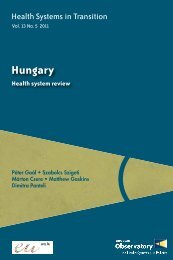Canada - World Health Organization Regional Office for Europe
Canada - World Health Organization Regional Office for Europe
Canada - World Health Organization Regional Office for Europe
Create successful ePaper yourself
Turn your PDF publications into a flip-book with our unique Google optimized e-Paper software.
50<br />
<strong>Health</strong> systems in transition <strong>Canada</strong><br />
en<strong>for</strong>ce, much less regulate, quality standards. Although interprofessional care<br />
has become a desired objective among governments, health care organizations<br />
and provider groups, there remain a number of barriers to implementation,<br />
including segregated education and training and institutional arrangements<br />
concerning remuneration and malpractice (Lahey & Currie, 2005; HPRAC,<br />
2008).<br />
2.8.3 Registration and planning of human resources<br />
Due to provincial jurisdiction over health human resources, there is no single,<br />
national system of registration and planning of human resources in <strong>Canada</strong><br />
(Wranik, 2008). The RCPSC, <strong>for</strong> example, is not a licensing body even though<br />
it sets standards <strong>for</strong> specialist medical education in <strong>Canada</strong> and is responsible<br />
<strong>for</strong> certifying specialists. Physicians certified by the RCPSC are not required to<br />
be registered as members of the RCPSC. While the <strong>Health</strong> Council of <strong>Canada</strong><br />
provides high-level analyses of health human resource issues at a pan-Canadian<br />
level, P/T governments are ultimately responsible <strong>for</strong> the regulation of the<br />
professions and human resource planning.<br />
In an ef<strong>for</strong>t to facilitate greater collaboration on a pan-Canadian basis,<br />
the F/P/T Conference of Deputy Ministers of <strong>Health</strong> created the Advisory<br />
Committee on <strong>Health</strong> Delivery and Human Resources (ACHDHR) in 2002.<br />
In 2005, the ACHDHR created a framework with the following three key<br />
objectives, subsequently endorsed by F/P/T ministers of health (ACHDHR,<br />
2007; Dumont et al., 2008):<br />
• avoid the risks and duplication associated with the current jurisdiction-byjurisdiction<br />
approach to human resources planning;<br />
• overcome barriers to implementing system design including population<br />
needs-based planning; and<br />
• increase health work<strong>for</strong>ce planning capacity.<br />
In response to concerns about how best to pursue health work<strong>for</strong>ce<br />
self-sufficiency in response to both the perception and the reality of shortages<br />
in all jurisdictions, the ACHDHR also conducted a human resource study<br />
on behalf of F/P/T governments (ACHDHR, 2009). To date, there has been<br />
no major evaluation conducted on the changes precipitated by ACHDHR’s<br />
initiatives.
















